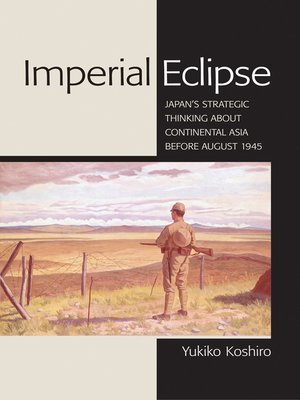Imperial Eclipse
ebook ∣ Japan's Strategic Thinking about Continental Asia before August 1945 · Studies of the Weatherhead East Asian Institute, Columbia University
By Yukiko Koshiro

Sign up to save your library
With an OverDrive account, you can save your favorite libraries for at-a-glance information about availability. Find out more about OverDrive accounts.
Find this title in Libby, the library reading app by OverDrive.



Search for a digital library with this title
Title found at these libraries:
| Loading... |
The "Pacific War" narrative of Japan's defeat that was established after 1945 started with the attack on Pearl Harbor, detailed the U.S. island-hopping campaigns across the Western Pacific, and culminated in the atomic bombings of Hiroshima and Nagasaki, Japan's capitulation, and its recasting as the western shore of an American ocean. But in the decades leading up to World War II and over the course of the conflict, Japan's leaders and citizens were as deeply concerned about continental Asia—and the Soviet Union, in particular—as they were about the Pacific theater and the United States. In Imperial Eclipse, Yukiko Koshiro reassesses the role that Eurasia played in Japan's diplomatic and military thinking from the turn of the twentieth century to the end of the war.Through unprecedented archival research, Koshiro has located documents and reports expunged from the files of the Japanese Cabinet, ministries of Foreign Affairs and War, and Imperial Headquarters, allowing her to reconstruct Japan's official thinking about its plans for continental Asia. She brings to light new information on the assumptions and resulting plans that Japan's leaders made as military defeat became increasingly certain and the Soviet Union slowly moved to declare war on Japan (which it finally did on August 8, two days after Hiroshima). She also describes Japanese attitudes toward Russia in the prewar years, highlighting the attractions of communism and the treatment of Russians in the Japanese empire; and she traces imperial attitudes toward Korea and China throughout this period. Koshiro's book offers a balanced and comprehensive account of imperial Japan's global ambitions.
|The "Pacific War" narrative of Japan's defeat that was established after 1945 started with the attack on Pearl Harbor, detailed the U.S. island-hopping campaigns across the Western Pacific, and culminated in the atomic bombings of Hiroshima and Nagasaki, Japan's capitulation, and its recasting as the western shore of an American ocean. But in the decades leading up to World War II and over the course of the conflict, Japan's leaders and citizens were as deeply concerned about continental Asia—and the Soviet Union, in particular—as they were about the Pacific theater and the United States. In Imperial Eclipse, Yukiko Koshiro reassesses the role that Eurasia played in Japan's diplomatic and military thinking from the turn of the twentieth century to the end of the war.
Through unprecedented archival research, Koshiro has located documents and reports expunged from the files of the Japanese Cabinet, ministries of Foreign Affairs and War, and Imperial Headquarters, allowing her to reconstruct Japan's official thinking about its plans for continental Asia. She brings to light new information on the assumptions and resulting plans that Japan's leaders made as military defeat became increasingly certain and the Soviet Union slowly moved to declare war on Japan (which it finally did on August 8, two days after Hiroshima). She also describes Japanese attitudes toward Russia in the prewar years, highlighting the attractions of communism and the treatment of Russians in the Japanese empire; and she traces imperial attitudes toward Korea and China throughout this period. Koshiro's book offers a balanced and comprehensive account of imperial Japan's global ambitions.






